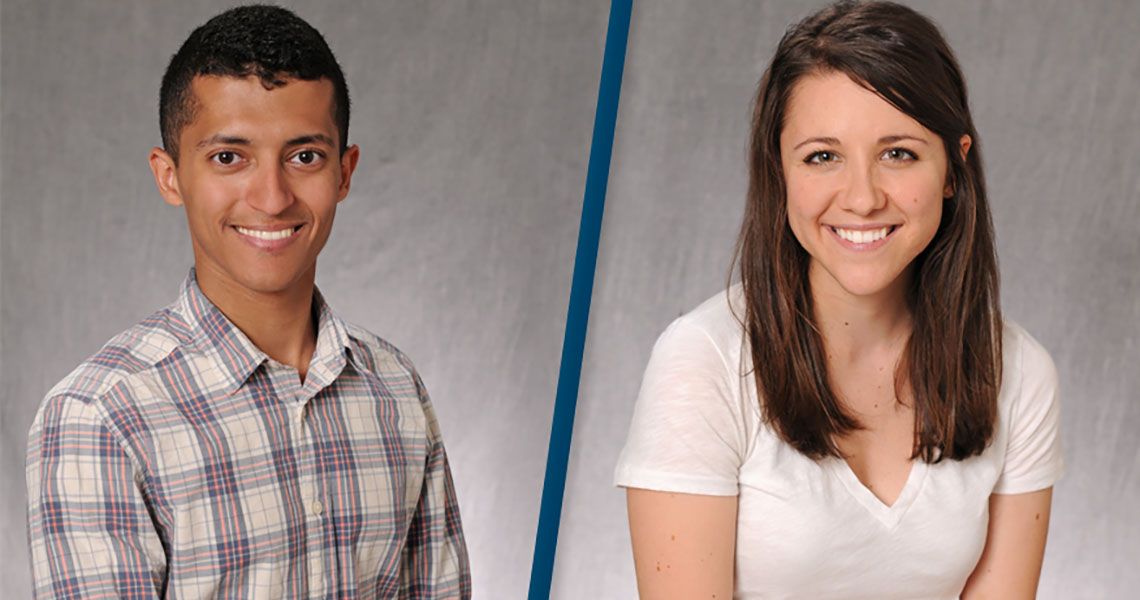For more than 25 years, the Office of International Medicine Programs (IMP) at the George Washington University (GW) School of Medicine and Health Sciences (SMHS) has offered life-changing educational opportunities to its students.
Two current students, fourth-year MD student Mohamed Al-Amoodi and third-year MD student Christina Pugliese, have made the most of their time at SMHS by watching their passion for medicine grow and by gaining a broader perspective of health care and health education in the U.S. and abroad.
Mohamed Al-Amoodi
As Mohamed Al-Amoodi’s time as a medical student at GW winds down, he’s looking forward to the years ahead, knowing he’ll be learning and studying at his No. 1 choice for residency: the University of British Columbia (UBC).
Al-Amoodi, who is in the four-year MD Program for International Students, was matched in UBC’s Orthopaedic Surgery program. It’s clear he could not be more excited for the opportunity, and it’s thanks to the education he received at SMHS.
“I think every medical school prepares us for the rigors of becoming a doctor, but GW takes it a step further,” he said. “I want to make the world a better place, and GW has set those pillars up for me, and the rest is up to me to build.”
Al-Amoodi is a dual-citizen of Yemen and Canada; his family is originally from a province in Yemen called Hadhramout. He says he chose to come to GW for medical school because he wanted to learn about both the public health and the clinical sides of medicine.
“[By] being in the nation's capital and by partaking in the various public health initiatives, GW gave me a unique set of experiences which no other medical school in the U.S. could teach,” he said. “I think that GW set me up for success to become a global leader and a role model in medicine.”
Yemen, he said, is in the middle of medical and political turmoil, and he wanted an education and experiences that would give him the tools to tackle those issues when he one day returns to practice in his home country.
The SMHS MD Program for International Students prides itself in the work it does to prepare future physicians like Al-Amoodi to return to their home countries to practice medicine while advancing the SMHS mission to improve the health and well-being of local, national, and global communities.
Al-Amoodi adds that he knows there will be challenges as he begins his residency – he is entering into the health care workforce in the midst of a pandemic after all.
“It feels like those old war movies where newly drafted recruits who never held a rifle, go into the battlefield headfirst against an enemy,” he explained, “except here the enemy is invisible to the naked eye. [But] this is what I have been prepared for throughout medical school and my life, and I think that I will become a better physician through this experience.”
Christina Pugliese
Rather than spend the final six months of 2019 in the familiar surroundings of Washington, D.C., Christina Pugliese traveled to Gabon, along the Atlantic Coast of central Africa, to conduct research using point-of-care ultrasound (POCUS) for the clinical management of malaria patients, thanks to support from the Lazarus Scholars in Health Care Delivery Program.
The scholarship, created by Gerald Lazarus, MD ’63, and his wife, Audrey Jakubowski Lazarus, PhD, helps medical students pursue unique educational opportunities in health care in the United States and abroad.
In Gabon, Pugliese dedicated herself to helping determine whether ultrasound indices of dehydration and pulmonary edema correlate with their respective physical exam findings and whether that indicates POCUS could be used as an additional decision-making tool for fluid administration at the bedside.
“Fluid balance is notoriously difficult with malaria,” she said. “In severe cases, dehydration can progress to kidney failure and shock. Intravenous fluids are therefore typically given as one of the first steps in the management of hospitalized patients.”
However, she added, in some severe cases malaria can show respiratory distress because of damage of the lining of the small airways and consequent fluid buildup, or edema, in the lungs. Fluid administration in these settings is dangerous, as it can worsen edema and lead to respiratory failure.
“Currently, decisions on fluid administration are done on a case-by-case basis using the physical exam,” Pugliese said. But that’s an imperfect tool. “Our hope is that POCUS may be used in addition to the physical exam for clinicians looking to make rapid bedside decisions on whether or not to administer fluids to patients with severe malaria,” she said.
Pugliese called the experience living in Gabon “wonderful.” She lived with other student interns from around the world and also had the opportunity to brush up on her French, the official language of Gabon.
“My afternoons were typically spent conducting follow-up exams with enrolled participants. Weekends were often spent shopping at the local markets with the other students and cooking together in the evenings,” she said.
She added that the opportunity opened her eyes to the importance, as someone new coming into a community, of working closely with members of that community at every step.
“Receiving this scholarship has opened up a world of opportunity for me,” she said. “It has given me the ability to learn about and to immerse myself in the field of global health, and to connect with others around the world in ways that would otherwise not be possible. I feel immensely grateful.”



